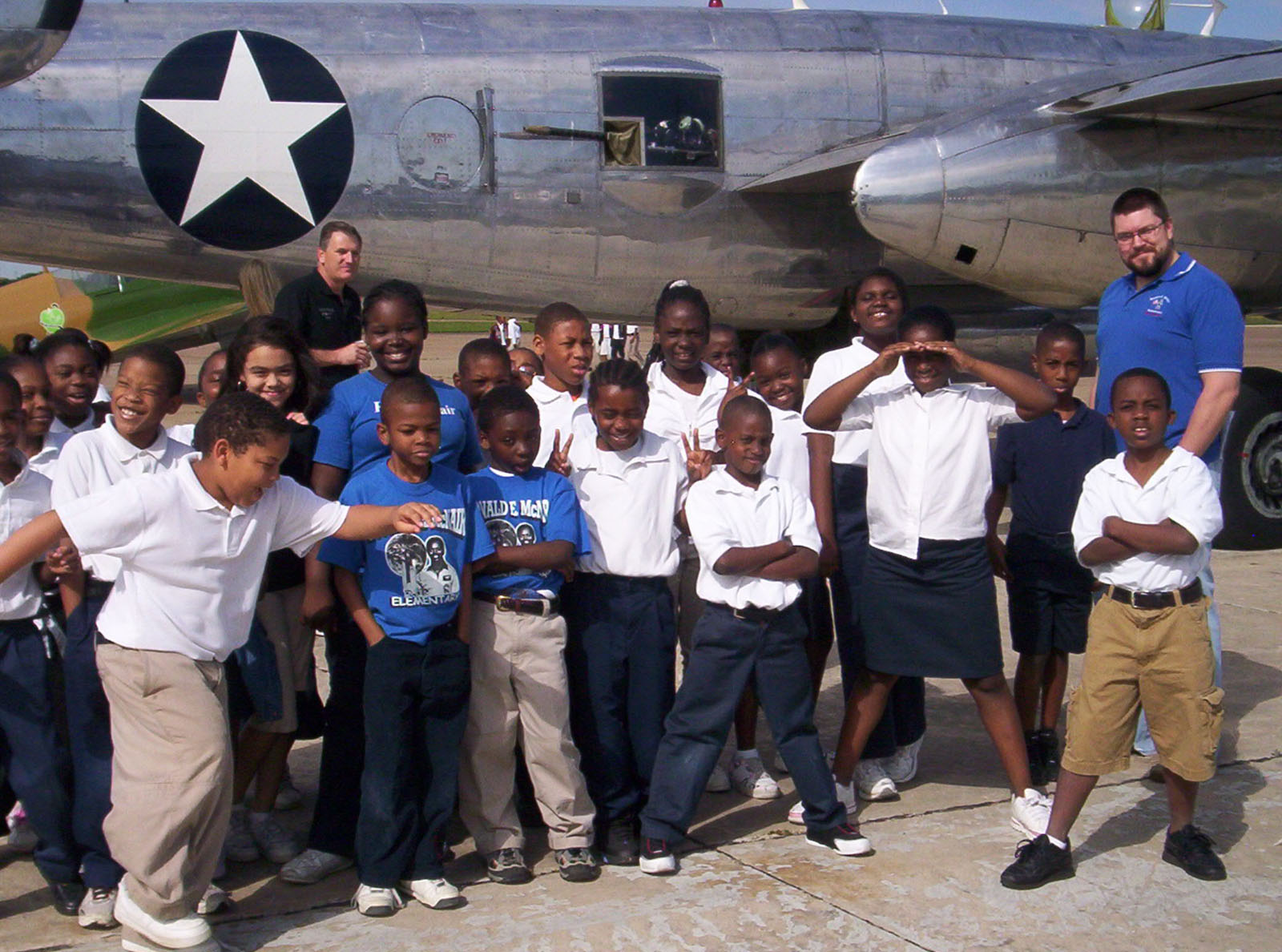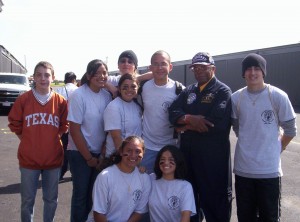
Adm. James R. Ellison poses with some of the aviation-minded students who have been touched by the Golden Heart Foundation’s Reach for the Stars program.
By Clayton Moore
It takes some people years to find their true calling. One extraordinary aviator and physician in Dallas has finally come into his own as an educator and inspiration to tomorrow’s children.
Texas Adm. James R. Ellison, a longtime officer in the Civil Air Patrol and a gifted artist in his own right, has spent the last 15 years building a remarkable nonprofit organization, the Golden Heart Foundation. Its mission is to educate inner city youth about all aspects of the aviation industry, focus their attention on health and wellness, and inspire them to higher aspirations than they might have imagined for themselves.
It began with a simple coloring contest. The foundation’s mission has expanded significantly to include educational programs focused on math, science, technology and communication, as well as a new training program that may well give the aviation industry some of the pilots and aeronautical engineers of tomorrow.
The organization’s mission has strong roots in the story of its charismatic founder. James Ellison was raised in Ohio, where he first began to dream of flying.
“It was a challenge for me to face my fears,” Ellison recalled. “My parents used to say, ‘We weren’t born with wings. Why would you want to learn how to fly?’ I just wanted to challenge myself in the biggest ways I knew how, and part of that experience was learning to fly.”
After high school, he joined the United States Air Force. During his three years in the service, Ellison did learn to fly, but he also used his burgeoning artistic skills to illustrate the nose cones of F-111 Aardvarks. A colonel took the young serviceman under his wing and encouraged him to go to college. That facilitated Ellison’s early discharge from the military. Ellison went on to pursue his dream by completing a visual arts degree at the University of Texas, winning national art awards in the process.
Although he was a talented and dedicated artist, Ellison’s aspirations ultimately pulled him in a different direction. He later trained in Washington to become an orthopedic physician assistant, a position he held for many years at a number of medical facilities in Dallas.
Health and safety
During the course of his medical work, Ellison was inspired to pursue a more educational role.
“Working in the hospital, I saw a lot of kids coming across the table with injuries that were unnecessary,” he said. “If they were aware of safety, knew to eat the right foods, had been taught to cross the street safely or ride with a bicycle helmet, their problems might never have happened. When we first started Golden Heart, its purpose was to promote health and safety education for children.”
Ellison drew a picture and offered it as a coloring contest to all the K-Mart stores in the Dallas area. More than 25,000 children entered the contest, and Ellison and his volunteers reached 5,000 more by visiting schools and hospitals in the Dallas-Fort Worth corridor.
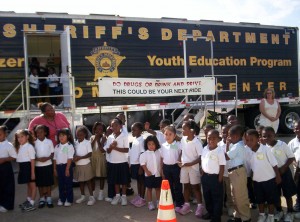
The Golden Heart Foundation collaborates with local fire and police authorities throughout the Dallas-Fort Worth region to extend its message of fire, drug and crime prevention to children like these, pictured at a June 2006 event.
Armed with donated costumes of characters like “Front Row Joe,” from the Cinemark theater chain and an Oreo cookie from Nabisco, Ellison and his volunteers cheered up many sick kids during their hospital visits.
“We would chase each other down the hallways, milk in hand,” Ellison laughed. “Imagine me dancing, rolling on the floor, chasing my tail or a big Oreo cookie down the hallways of a hospital. We used to do some crazy things for those kids. It was really something when a nurse would come out and say, ‘That child hasn’t smiled in six months, and you’re the first visitor that has made her grin.’ Anything I could do to put a smile on the face of a kid, I’d do.”
The program was such a success that within three months the group that would become Golden Heart took the contest statewide, visiting more than 50,000 inner-city youth and hospital patients and inspiring more than 700,000 children to enter the coloring contest.
In 1993, Ellison formed a nonprofit corporation to formalize his organization. Over the course of the last decade, it has grown to become a consistently generous and vital part of the Dallas community. The organization has given 900 pairs of new shoes to seniors and inner city youth, provided free blood pressure screenings, fed needy families and produced plays condemning drugs and crime.
Another ongoing program is Golden Heart’s “Teddy Bear X-Mas,” a special event held once a year, during which Golden Heart volunteers bring the gift of teddy bears to children in need. The program has given more than 5,000 Christmas gifts to children during the course of its existence.
“Sometimes organizations like Toys for Tots, while wonderful, don’t always get into some of the inner-city areas,” Ellison said. “These are kids whose fathers are in prison or whose mothers are on drugs, kids in Head Start programs who might not get anything for Christmas. We come in to make sure that the ones who’ve been left behind get something. Many like-minded folks donate either their time or their money, and we get teddy bears in their names to hand out.”
The Texas admiral
While he’s had a remarkable career and marked success with the Golden Heart Foundation, Ellison has never left aviation far behind. After leaving the Air Force, he spent many years as a lieutenant colonel in the Civil Air Patrol, serving in both air and ground crews in the Rocky Mountain region.
“I was in special operations and emergency services,” he recalled. “I was one of the few CAP officers sent to attend the first Air Force Academy program for CAP officers. We performed a lot of missions at the Air Force’s behest, including search and rescue and recovery efforts.”
Over the course of his service, Ellison accumulated more than 1,000 hours of mission time and trained more than 3,000 officers and cadets. He twice received the CAP’s Life Saving Award, as well as the Bronze Star for a profoundly brave act of heroism.
In the early 1980s, Ellison went on a rescue mission in a Helio Courier, to assess the condition of a crashed aircraft.
“A plane went down, but no one wanted to get near it because of the ordinance it was carrying,” he remembered. “It was going to blow. I flew past everyone. I didn’t think about my life at the time; I was young and dumb. I pulled the pilot out anyway. The fireball burned right through my flight suit, but I saved this guy.”
Ellison’s title is an interesting story in itself. Because of his admirable efforts with the Golden Heart Foundation, he was commissioned in 1997 as an admiral in the Texas Navy. Gov. Price Daniel reestablished this governmental organization in 1958 by to honor the valor of citizens who provide a service to the state of Texas. Ellison’s commission came from the governor at the time, George W. Bush.
“I never thought much about the commission,” Ellison remembered. “Everyone knew me as colonel. One day, some of the Golden Heart volunteers saw my commission lying on the floor of my office and were impressed. It turns out that very few people are commissioned as a Texas admiral. I called up the governor’s office to see if it was a real designation and was told, ‘Yes, Admiral.’ I decided to use my title for the kids.”
Reach for the stars
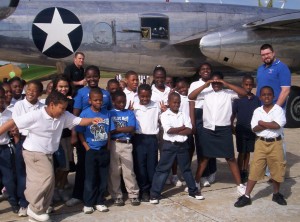
The Reach for the Stars program gives children the chance to sit in real airplanes and talk to pilots and inspirational heroes like the Tuskegee Airmen.
Armed with his new “admiralship” and brimming with ideas, Ellison started contemplating a new program that would augment Golden Heart’s mission.
“When we started flying in to different events with lieutenants from the Civil Air Patrol, we noted that some of the kids who came out to the airport to meet us were really interested in the aircraft and ourselves as pilots,” he remembered. “After that, I started thinking that we could use Golden Heart to promote aviation and maybe turn some of these kids around.”
Golden Heart retains a core value focused on health, physical fitness and the prevention of crime, drugs and fire. However, its mission has evolved.
“Our core values are the same,” Ellison said. “We’ve simply added a focus on aviation education as well. We want kids to meet the aviators and engineers who live in our community. We want them to meet the Hispanic pilots who fought in World War II or the Tuskegee Airmen. I would venture to say that aviators were the pioneers in battling segregation. Because of the camaraderie among pilots, you can fly anywhere in this country today and not see color when you land at one airport or another. You see only pilots.”
Some of the surviving Tuskegee Airmen have become valued proponents of the foundation. A few years ago, Ellison invited three of the surviving aviators to an event sponsored by the organization, where they flew in some L-39 jet trainers.
“Don Elder, who was a corporal and air crew mechanic during the war, flew in and loved it,” Ellison recalled. “We had about 2,000 ROTC cadets and a lot of kids out that day. He went back and told the Tuskegee Airmen organization about our mission, and they wanted to be a part of what we do. Every one of them has loved attending, because they’re able to connect to young people, which is what they want to do these days. When they come to see us, they meet a lot of inner-city kids who need exposure to these men of greatness.”
The aviation arm of Golden Heart falls under the umbrella of its Reach for the Stars Program, a multifaceted effort to teach children about aviation, math, science and technology. Ellison hopes to expand the program in the coming years beyond the Dallas-Fort Worth arena, to the regional, state and even national level.
In the past year, Ellison has worked with several organizations to introduce a scholarship program, which will put up to 50 young people through ground school and pay for approximately 14 hours of flight time, to fully introduce them to the aviation experience. Ellison’s partners include Slipstream Flight School, Silver State Helicopter and Aviation Education International. He hopes to build a comprehensive introduction to different aspects of aviation, including safety training, airframe maintenance, carbon-fiber manufacturing and other skills.
“I want to see students in the 11th grade learn the basics of flight and then, when they turn 18, transition right into flying,” Ellison said. “By the time they graduate, they could be six months ahead of someone walking in off the street. They will know so much about the aviation industry by then, it shouldn’t take them long to get their associate’s degrees.”
Ellison’s plans don’t end there. He would one day like to see a fleet of Golden Heart Foundation aircraft restored and assembled by students and piloted to Oshkosh and other national aviation conferences.
“As we expand, we’ll try to get a hangar and acquire some donated aircraft, so the kids can work on them to make them airworthy,” Ellison said. “Then we can utilize the planes to teach kids to fly, and flight schools can use the Golden Heart aircraft as learning tools, giving our kids a discount, and then they take them up flying. Kids in the inner city don’t have deep pockets, so whatever we can do to cut prices will help.”
Ellison says that he finds it startling what children and even adults in his community don’t know about their local aviators, airports and resources.
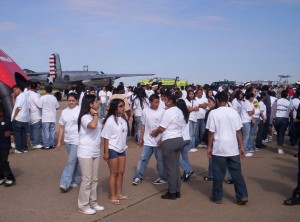
The Golden Heart Foundation’s many events bring children into close contact with pilots and their aircraft, giving them aviation experiences that may change their lives.
“I went to a school named after Challenger astronaut Ronald McNair,” Ellison recalled. “His flight suit hangs in the atrium of that school, but the kids didn’t even know who he was. I wear a patch to honor Challenger’s astronauts, and one of their teachers couldn’t even recognize it. The same one’s on his flight suit hanging in the school’s atrium. It’s amazing. Some kids just don’t know what’s available to them in their own communities, and that’s why we want to reach more kids.”
Ellison’s approach to his charges, some of whom have never met a pilot before, follows a common sense, no-nonsense methodology. Ellison wears a sharp black uniform with the military accoutrements of the Texas Navy and the effect on students is significant.
“When I talk to them about aviation, they start to see the possibilities,” Ellison said. “I explain that when you become an aviator, your speech improves. You can’t use slang when you’re speaking into an aircraft receiver. You have to learn about the history, geography, politics and people of the place into which you’re flying. You never know what part of the world you might be landing in, and it’s nice to know something about a place before you land. You’d be surprised how much nicer people are when you know something about their culture.”
The efforts of the foundation have been widely recognized at both the state and national level. Among his recognitions are a certificate of appreciation from Congress and a letter from the White House signed by President Bush, which supports his efforts to motivate children. But the most significant feedback to Ellison comes from another interested group.
“I get letters back from teachers saying that their students’ grades improved, because they were approached with an experience that put all that book learning into perspective,” Ellison said. “We’re going to touch these kids by letting them experience aviation for themselves.”
The foundation accomplishes a remarkable amount of work for its size. Ellison and a small staff of volunteers have organized events that have drawn significant crowds. In April, the foundation held an event in Dallas that drew two Tuskegee veterans, a host of fighter jets and more than 5,000 visitors.
Ellison doesn’t fly much anymore, preferring to encourage an aviation neophyte to take a ride with one of the pilots who frequent his events. But at the April event, a friend convinced him to take the controls of an L-39 jet trainer.
“The pilot let me have the controls, and we were doing some tight maneuvers over the airport,” Ellison said. “When I landed, the shocked volunteers said, ‘I didn’t know you could do all of those things.’ I told them, ‘Just because I choose not to fly doesn’t mean I can’t do it.’ I think they were impressed.”
In addition to fundraising and expanding the Reach for the Stars Program, Ellison intends to maintain his focus on bringing new insights to children.
“If you have kids who aren’t being supported properly, they need people like us to lift them up,” Ellison said. “I believe in this great country, and I know there are good people in every corner of it. That’s why I brag so much about the aviation community. If you go out to any airport in the country, you can find someone to whom you can relate personally. Our stories are very similar.”
For more information about the Golden Heart Foundation, visit [http://www.goldenheartfoundation.com].











